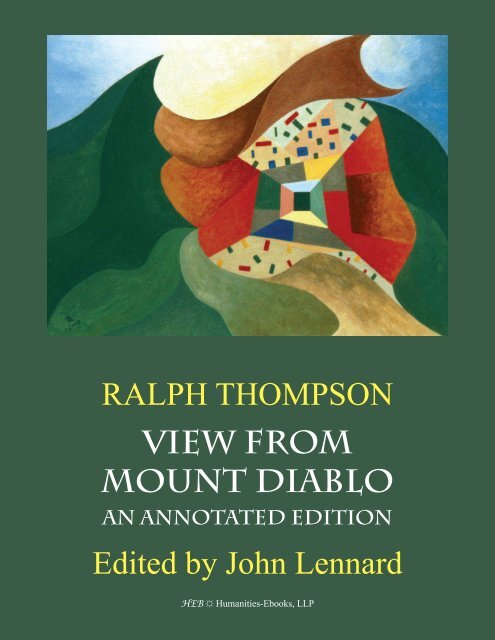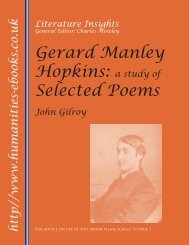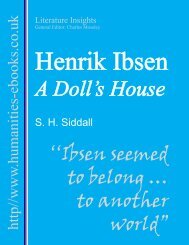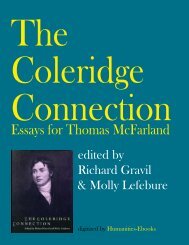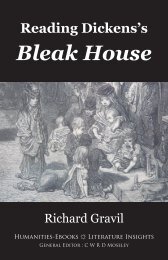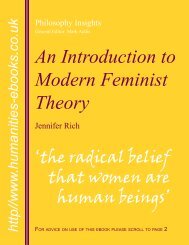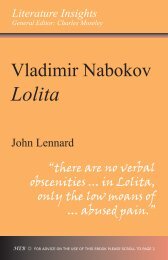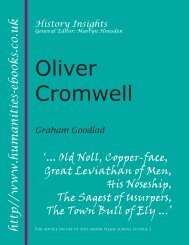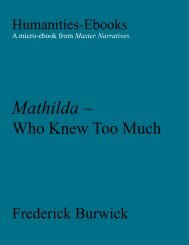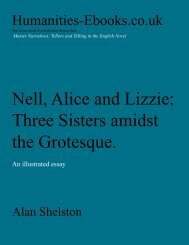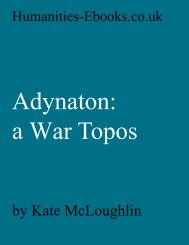by John Lennard - Humanities-Ebooks
by John Lennard - Humanities-Ebooks
by John Lennard - Humanities-Ebooks
You also want an ePaper? Increase the reach of your titles
YUMPU automatically turns print PDFs into web optimized ePapers that Google loves.
<strong>Humanities</strong>-<strong>Ebooks</strong><br />
Genre Fiction Sightlines<br />
Tamora Pierce<br />
The Immortals<br />
Ralph Thompson<br />
Wild Magic<br />
Wolf-Speaker<br />
The Emperor Mage<br />
The Realms of the Gods<br />
View from<br />
Mount Diablo<br />
An Annotated Edition<br />
Edited <strong>by</strong> <strong>John</strong> <strong>Lennard</strong><br />
<strong>by</strong> <strong>John</strong> <strong>Lennard</strong><br />
HEB ☼ <strong>Humanities</strong>-<strong>Ebooks</strong>, LLP
Ralph Thompson<br />
View from Mount Diablo<br />
An annotated edition<br />
<strong>by</strong><br />
<strong>John</strong> <strong>Lennard</strong><br />
HEB ☼ <strong>Humanities</strong>-<strong>Ebooks</strong>, 2009
Publication Data<br />
View from Mount Diablo © Ralph Thompson 2003, 2009<br />
Introduction and annotations © <strong>John</strong> <strong>Lennard</strong> 2009<br />
‘Launch Speech’ © Wayne Brown 2003, 2009. Published <strong>by</strong> kind permission of Wayne<br />
Brown.<br />
‘The Inner Part’ © Louis Simpson 1963. Reprinted <strong>by</strong> kind permission of Louis Simpson.<br />
Cover image: ‘Mount Diablo’ © <strong>John</strong> Laidlaw<br />
The editor has asserted his right to be identified as the author of this Work in accordance with<br />
the Copyright, Designs and Patents Act 1988. Copyright in images and in quotations remains<br />
with the sources given.<br />
A material edition of this book ISBN 9781845231446 is published simultaneously <strong>by</strong> Peepal<br />
Tree Press in Leeds, and is available both from their website and from all good bookshops.<br />
http://www.peepaltreepress.com<br />
This electronic edition published in 2009 <strong>by</strong> <strong>Humanities</strong>-<strong>Ebooks</strong> LLP.<br />
Tirril Hall, Tirril, Penrith CA10 2JE<br />
How to use this Book<br />
To use the navigation tools, the search facility, and other features of the toolbar, this Ebook<br />
should be read in default view. To navigate through the contents use the hyperlinked ‘Bookmarks’<br />
at the left of the screen. To search, click on the binocular symbol in the toolbar. For<br />
ease of reading, use to enlarge the page to full screen. Use to return to the<br />
full menu. Hyperlinks appear in Blue Underlined Text.<br />
Licence and permissions<br />
Purchasing this book licenses you to read this work on-screen and to print one copy for your<br />
own use. Copy and paste functions are disabled. No part of this publication may be otherwise<br />
reproduced or transmitted or distributed without the prior written permission of both the copyright<br />
owner and the publisher. Making or distributing copies of this book constitutes copyright<br />
infringement and would be liable to prosecution. Thank you for respecting the rights of the<br />
author.<br />
ISBN 978-1-84760-093-6
CONTENTS<br />
Acknowledgements 6<br />
Map of Jamaica 7<br />
Introduction “a cloud shaped like his island home” 8<br />
Form (1) The verse-novel (and crime) 10<br />
Pushkin and the nineteenth century 10<br />
Seth and the late twentieth century 12<br />
The Commonwealth and Caribbean Clusters 15<br />
Versification and metrics 22<br />
Form (2) The Bildungsroman 25<br />
Background (1) Jamaica in World War 2 29<br />
Background (2) “Blood / cheaper than drugs.” 31<br />
A brief history of current drugs legislation 33<br />
The new triangular trade 34<br />
Early Reception 36<br />
Wayne Brown, Launch speech 37<br />
Fr. Gerard Leo McLaughlin SJ, Sunday Observer 43<br />
View from Mount Diablo 45<br />
Prologue 48<br />
Chapter One 50<br />
Chapter Two 53<br />
Chapter Three 58<br />
Chapter Four 62<br />
Chapter Five 65<br />
Chapter Six 68<br />
Chapter Seven 74<br />
Chapter Eight 78<br />
Chapter Nine 81<br />
Chapter Ten 86<br />
Chapter Eleven 91<br />
Chapter Twelve 96
5<br />
Annotations 100<br />
Prologue 101<br />
Chapter One 104<br />
Chapter Two 108<br />
Chapter Three 113<br />
Chapter Four 117<br />
Chapter Five 122<br />
Chapter Six 125<br />
Chapter Seven 137<br />
Chapter Eight 143<br />
Chapter Nine 146<br />
Chapter Ten 154<br />
Chapter Eleven 160<br />
Chapter Twelve 168<br />
Bibliography 175<br />
Poetry 175<br />
Essays 177<br />
Journalism 178<br />
Reviews of Ralph Thompson’s Work 181<br />
Verse-Novels and Poetry Cited 182<br />
Bildungsromans and Memoirs Cited 186
6<br />
ACKNOWLEDGEMENTS<br />
My greatest debt, of course, is to Ralph Thompson, not only for View from Mount<br />
Diablo itself and the many rewards it has afforded me in reading and annotating, but<br />
for his patience in answering queries, help in compiling the bibliography of his<br />
work, careful reading of the typescript introduction and annotations, and supply of<br />
some additional glosses as well as various corrections. Frequent hospitality in a<br />
fascinating house with its own stunning views over troubled Kingston, and the<br />
gracious kindness (and cooking!) of his wife Doreen, made an always interesting<br />
project a great and memorable pleasure.<br />
Professor Emeritus Edward Baugh, of the University of the West Indies–Mona, a<br />
very fine poet as well as the doyen of Caribbean critics, was also kind enough to<br />
read the typescript, and greatly improved the introduction; his generosity with his<br />
time and skill, memory and understanding, were remarkable, and deeply appreciated<br />
<strong>by</strong> an annotator always conscious of his own less than Jamaican credentials. At both<br />
early and late stages in the project Professor Kwame Dawes, another fine poet who<br />
read a draft MS for Peepal Tree, was with Jeremy Poynting rightly firm in directing<br />
me to a range of Caribbean echoes, resonances, and contexts I had missed or<br />
slighted, and the whole is far stronger for their care; Jeremy also kindly and cleverly<br />
supplied very useful wording in a score of notes. Some fruitful disagreements having<br />
remained disagreements, I should add that some of the views expressed, like all<br />
mistakes, are mine alone. Mr Aeon Forbes, of the Library Department of The<br />
Gleaner, was helpful in tracking down items for the bibliography; and Ben Ramm,<br />
editor of The Liberal, was kind enough to commission a piece on verse-novels (for<br />
the Spring 2009 issue) that helped me to focus what I wanted to argue.<br />
Louis Simpson was kind enough to grant permission to reprint the text of his<br />
poem ‘The Inner Part’, and Wayne Brown equally kindly granted permission to<br />
include the text of his ‘Launch speech’ for the first edition of the poem in 2003.<br />
Finally, I would like to thank those students at UWI–Mona to whom I have<br />
taught View from Mount Diablo, and whose responses, both enlightening and<br />
puzzled, persuaded me that an annotated edition could benefit readers everywhere.<br />
JCL
8<br />
Introduction<br />
“a cloud shaped like his island home”<br />
Like its author, View from Mount Diablo is powerfully hybrid—a verse-novel that<br />
won the Jamaican National Literary Award in manuscript in 2001, and was<br />
published in the UK <strong>by</strong> Peepal Tree Press in 2003. Ralph Thompson (b.1928) is a<br />
white Jamaican, of crypto-Jewish and Irish stock, who received a Jesuit education.<br />
Through his absent father’s US nationality he was eligible for military service, and<br />
after graduating in law from Fordham University in 1950 spent two years as a USAF<br />
officer in Japan, but he is married to a Jamaican and has lived in Kingston save for a<br />
brief period in the 1970s when political violence forced the family overseas.<br />
Thompson’s career was largely in business, with Seprod Ltd (a large firm supplying<br />
household commodities and consumer products, for whom he was a long-serving,<br />
highly successful CEO), but included educational activism with extensive<br />
journalism, exhibitions of paintings, and latterly two well-received poetry<br />
collections—The Denting of a Wave (1992) and Moving On (1997) 01 —before<br />
expanding with View from Mount Diablo to embrace the verse-novel. Itself<br />
intrinsically hybrid, that form is stretched <strong>by</strong> the generic models for Thompson’s<br />
plot, the Bildungsroman and the crime novel, and additionally distorted <strong>by</strong> wideangle<br />
narration bending an account of Jamaican social and political history from the<br />
1930s–2000s into one truncated and foreshortened fictional life.<br />
The protagonist, reporter and family-man Adam Cole, remembers the war-years<br />
of the 1940s, and cannot be much younger than Thompson himself—born sometime<br />
in 1930–5. He married after graduating from university, c.1955, and <strong>by</strong> chapter 6 has<br />
a daughter of 15, making it the early 1970s. The violent, tragic events that dominate<br />
chapters 6–12 thus seem at first to invite mapping onto the ‘Manley Years’ (1972–<br />
80), and the final killings might be thought specifically to summon the later 1970s, a<br />
very bloody time in Jamaica—but the ‘Manley Years’, however neat a tag, marked<br />
an escalation as much as an inception, and all later events in the verse-novel<br />
subsume continuing, generically similar events of the 1980s–2000s. The particular<br />
role of the cocaine trade in the dénouement also points to a more recent date than the<br />
1970s, and it is clear the Jamaican history Thompson presents, if profoundly verisimilar,<br />
is as much an archetypal assemblage of chronic political and psychological<br />
1<br />
Both are published <strong>by</strong> Peepal Tree Press.
symptoms as a chronological account of events. Historicised narrative with<br />
explicitly political chapters create this verse-novel as (beyond its other genres) a<br />
state-of-the-nation report, shaping it “like his island home” (48).<br />
What that report fundamentally posits, theologically, politically, and culturally,<br />
is fratricide. Properly speaking, Adam’s killer Nathan is neither his blood- nor milkbrother,<br />
but he is his greatest childhood friend, a sometime heart-brother in<br />
adventure—though not education, for while Adam goes to Oxford, Nathan goes<br />
nowhere, and must grub privilege through ruthless entrepreneurial success in the<br />
drug trade/s. Adam’s parents welcome Nathan as playmate but do little for him<br />
financially, allowing him to foster ambitions and breathe atmospheres he would not<br />
otherwise have known and will never have the means to satisfy. So doing, they<br />
inadvertently make their thin care seem to Nathan like callousness, and so pave the<br />
road that leads to a reprise of Cain and Abel. Adam’s terminal death is profoundly<br />
bleak, in the personal and theological senses of love failed and perverted, but also<br />
politically, for beyond the prophylactic slaughter of a playmate it represents a defeat<br />
of investigative journalism <strong>by</strong> organised crime. Ultimately, it also speaks to the<br />
bloody brotherhood of the two major Jamaican political parties, the Jamaica Labour<br />
Party (JLP) and People’s National Party (PNP), schismatically dividing during<br />
World War 2 and becoming with independence and its aftermaths like psychotic<br />
Siamese twins, fused through the skull but forever trying to kick one another to<br />
death.<br />
Given Thompson’s subtle mixing of specific and typical events, precision and<br />
suggestion, readers unfamiliar with Jamaica’s political development and social<br />
difficulties since the 1930s might best begin <strong>by</strong> consulting a good, short article<br />
outlining them. 11 Particular references are annotated and some general background<br />
given later in this introduction, but greater knowledge than I have space to provide<br />
of the late colonial period, West Indies Federation (1958–62), subsequent Jamaican<br />
independence, ‘Manley Years’ in the 1970s, and social and criminal trends throughout<br />
the later century, will be of real value to readers. Subsequent sections of this<br />
introduction deal with the verse-novel and Bildungsroman as formal models,<br />
including Thompson’s relation to other Caribbean examples; with the World War 2<br />
background that dominates the early part of View from Mount Diablo and the<br />
cocaine trade that dominates its later part; and with its launch and early reception in<br />
Jamaica.<br />
9<br />
1<br />
See e.g. http://en.wikipedia.org/wiki/Jamaica or<br />
http://www.discoverjamaica.com/gleaner/discover/geography/.
10<br />
Form (1)<br />
The verse-novel (and crime)<br />
The term ‘verse-novel’ has (like ‘prose poem’) an intrinsic paradoxicality often<br />
taken as a sign of levity—but recorded narrative begins in verse, with the anonymous<br />
pre-classical epic Gilgamesh (written c.1200 BCE, and perhaps a millennium<br />
older). The highly wrought forms of the great classical epics, Homer’s Iliad and<br />
Odyssey (probably 9 th century BCE) and Virgil’s Aeneid (written 29–19 BCE), attest<br />
to the advantages of verse in casting narrative, and in Virgil’s case to the explicitly<br />
political purposes verse-narrative may serve. Both lessons are reinforced <strong>by</strong><br />
mediaeval and Renaissance examples of long verse-narrative—including the<br />
anonymous French Chanson de Roland (12 th century), Dante’s La Commedia<br />
(completed c.1320), Boiardo’s Orlando Innamorato (1487) Ariosto’s Orlando<br />
Furioso (1532), and Tasso’s Gerusalemme Liberata (1581)—but later writers<br />
followed Virgil in fusing epic with romance, and were in turn followed <strong>by</strong> Spenser<br />
in The Faerie Queene (1596) and Milton in Paradise Lost (1667). Spenser in<br />
particular was <strong>by</strong> Book VI of The Faerie Queene also anticipating significant<br />
aspects of the kind of prose narrative now called ‘novels’, particularly in naming and<br />
handling character.<br />
The post-/Renaissance emergence of long prose fiction, culminating in the novel,<br />
was matched in poetry. The Restoration and eighteenth century saw many extended<br />
poems, from Butler’s Hudibras (1663–78), Pope’s The Rape of the Lock (1714), and<br />
the great 1716 translation of Ovid’s Metamorphoses to which Dryden contributed, to<br />
James Thompson’s The Seasons (1726–30), Macpherson’s Fingal (1762) & Temora<br />
(1763), 21 and Cowper’s The Task (1785). While not in any simple way ‘novels’ all<br />
clearly contested the growing supremacy of prose narrative; in a similar fashion the<br />
seventeenth- and eighteenth-century emergence of prose autobiography had <strong>by</strong> 1800<br />
provoked the emergence (with the first version of Wordsworth’s The Prelude) of the<br />
modern verse-autobiography.<br />
Pushkin and the Nineteenth Century<br />
Long verse narratives embracing epic and romance forms continued throughout the<br />
nineteenth century, but late Romanticism saw the emergence of what has come to be<br />
1<br />
These were supposed ‘tales of Ossian’, and contain free translations of Gaelic fragments, but<br />
were revealed <strong>by</strong> the Mackenzie Committee in 1805 to be substantially Macpherson’s creation.
Is this sample what you are looking for?<br />
If so, please browse our lists<br />
or look for different formats at:<br />
http://www.humanities-ebooks.co.uk<br />
or buy this PDF book<br />
HERE<br />
About <strong>Humanities</strong> <strong>Ebooks</strong><br />
<strong>Humanities</strong>-<strong>Ebooks</strong> is an an authors’ co-operative, not a commercial publisher.<br />
Our aim is to produce inexpensive, high quality <strong>Ebooks</strong>, and to pass the maximum<br />
possible proportion of the purchase price to their authors.<br />
Almost all our titles are available in Kindle format, though for academic books<br />
and those with complex layout the PDF is almost invariably superior.<br />
All our titles can be ordered <strong>by</strong> libaries through Ebrary, EBSCO and MyiLibrary.<br />
Paperback versions of many of our titles can be reached via the book descriptions<br />
on our website.


